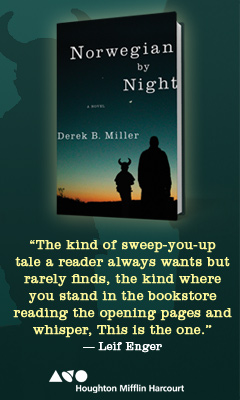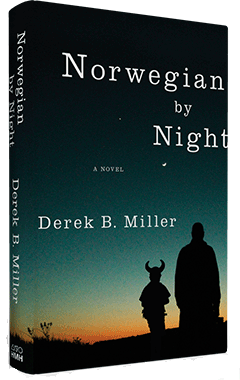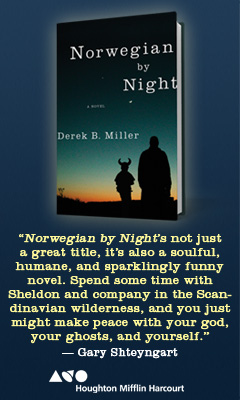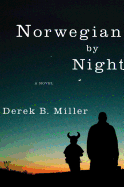Camilla_Waszink.jpg) |
| Photo: Camilla Waszink |
Derek B. Miller is the director of the Policy Lab and is a senior fellow with the United Nations Institute for Disarmament Research. Born and raised in Boston, he has lived abroad for more than 15 years, in Norway, Switzerland, Britain, Israel and Hungary. He now lives in Oslo with his wife and two children. Miller's debut novel, Norwegian by Night, will be published by Houghton Mifflin Harcourt on May 21, 2013.
Sheldon Horowitz is one of the most unusual and intriguing characters to emerge in fiction for a long time. Where did the inspiration for Sheldon come from, and how did he develop for you?
Sheldon was a minor character in an unpublished manuscript and was someone I knew would need to be explored and understood much more later. But the inspiration for Sheldon came much earlier and from several places. I was extremely close with my maternal grandfather--Lester Shapiro--who did not have a life like Sheldon's, nor did he have Sheldon's "rich inner life," but his love for me was boundless, and that intimacy informed the love between Sheldon and his own son, Saul.
I chose the old-fashioned and very Jewish name "Sheldon Horowitz" because I wanted a name that suggested a very specific sort of character that we think we know in American life. And then I wanted to undermine that assumed knowledge by demonstrating a world of emotion and experience and ideas that were real for real-life people like Sheldon and yet we have largely taken for granted or cloaked in a sort of decent mystery.
I was inspired to use the name Horowitz specifically because the writer James Salter was born James Horowitz, and also fought in Korea--though he was a pilot, not a sniper like Sheldon. I was reading Salter at the time to become a better writer. I would not draw any parallels between Sheldon and Mr. Salter, and I did not take Mr. Salter as any kind of model or character study for Sheldon, but I liked the notion of the private man being separate from the public assumption. These small sparks of inspiration do not always have deep origins. One shouldn't read too much into them.
The matter of "name changing", meanwhile, was quite common in that generation. Lester was called "Sonny" by everyone he knew when he was a teenager. And I chose Sheldon's youthful nom de guerre, "Donny," in direct homage to that. In fact, my grandmother knew Lester as Sonny until they were engaged, only to learn they would henceforth be Lester and Esther Shapiro.
There are no fewer than four wars discussed in this novel, and you've done an impressive job of showing readers both the horrible universals of these wars and their unique particulars. What aspect of war would you most like readers to know about or take away from this novel?
To understand any war, one has to engage in a very careful assessment of what is general about it, and what is highly particular about it, and it is that essential tension and consideration that I think is most important for readers to know and insist upon in others.
On the surface, war seems, and indeed is, the same. To say "war is hell" is to accurately describe it universally--that is, across social systems and through time.
But each is also a particular hell that requires not only a general understanding, but a highly situated, nuanced and refined understanding of the actors, relations among actors, history, means of combat, terrain and everything that a novelist would have to communicate to a reader to let that person enter into a specific world, and not a generalized one.
This is also what we need to know as citizens of a democracy, not only as readers, and we need to insist that our governmental and military institutions have the needed policy tools and instruments--not merely equipment--to achieve this understanding and strategically design plans of action to accommodate it. You might think they do. They don't. And this is essential if we want to prevent conflict, manage it or, if necessary, win it.
I would also add that we need this understanding in order to recover from war. In my story, I don't only talk about four wars, but about how men (and it was all men in this case) coped with or recovered from their return. Saul went back to war. Sheldon went to Europe with a camera. The different Balkan characters each had distinct--not homogenized--relationships to Norway and its peaceful nature.
Today, I'm deeply troubled by how American soldiers are returning with so little support from combat, and how poor our systems are for receiving them. The "suicide hotlines"--while necessary--are insufficient. Reintegration of our ex-combatants should begin before they are deployed. And this is something I know a fair amount about because I work on the design of post-conflict reintegration programs with the United Nations in my day job at the Policy Lab, in close collaboration with my colleague Lisa Rudnick at the UN Institute for Disarmament Research. In fiction and nonfiction, these topics are often on my mind.
 Dislocation is an important theme in the novel; so many of the characters are "strangers in a strange land." Can you explain how this theme developed for you?
Dislocation is an important theme in the novel; so many of the characters are "strangers in a strange land." Can you explain how this theme developed for you?
I've been a foreigner for a long time. I was studying at Georgetown for my Masters degree in national security studies in 1996, and I was lucky enough to be picked as one of three students from my program to complete the degree at St. Catherine's College at Oxford. For one reason or another I never managed to get back to the U.S. after living in the U.K. So I've been living in Europe--in the U.K., Hungary, Switzerland and Norway--for a good 17 years. Well, mostly good, anyway.
I married Camilla, a Norwegian woman, and now have two kids, Julian and Clara. So clearly, negotiating the familiar and the foreign will now be a permanent feature of my life.
As a writer, too--of fiction or nonfiction--it is essential to know what's "strange" about something to know what's worth describing or communicating about it. If you don't have a sense of this, the writing can be banal or flat. Where it gets particularly interesting is in the challenge of communicating this--though the art and craft of storytelling--to a specific audience so that it can be understood and appreciated in people's own frame of reference.
There is a difference between saying something is strange inherently, and saying it is strange to you. The first feels like it makes more intuitive sense because we naturally consider ourselves "normal." But I think the reality is that "strangeness" is a function of a disjuncture between a set of premises about the world and something new in it that doesn't quite fit. The writer needs to bring that dynamic into being in a way that is dramatically satisfying, not analytically heavy (like I'm doing now...).
By extension, the Jewish experience--that of a people permanently adrift--features prominently in this novel. Did you built the novel around this theme or did it develop later in the story?
The Jewish experience is certainly a prominent theme, but I'd say my novel is actually about how anchored and at home Jews are in America. For a Jewish American like Sheldon, being Jewish in Europe is to be adrift. If that wasn't the case, his feelings about Norway wouldn't make any sense. After all, there would be no comparison to make, and hence no tension to reconcile or explore.
The anchor of the novel is Sheldon, and the central tension is--for me--his effort to come to terms with the death of his son, for which he feels responsible, precisely because his love for America sent Saul to war. And his love for America is based on a very particular reading of the contrasting Jewish experience in America and Europe. When Sheldon explains that his country "armed him, and deployed him against his enemy" rather than betrayed him, he is not speaking to a jingoistic or triumphant Americanism (which has rung a shrill note for over a decade in the U.S., and I am notably not endorsing). Instead, we are listening to the voice of someone who has a home, and--using Melville's imagery--would shoot his own heart from his chest to defend it. And that passionate love comes precisely from knowing that we--as Jewish Americans--are not adrift. We are at home.
Once Sheldon came into view as a generational character--the Greatest Generation and all that--the pieces all fell into place. In many ways, this book was my way of saying good-bye to my grandfathers, Lester Shapiro and Paul Miller. So I'd say it was built right in from the start.
At its darkest moments, Norwegian by Night maintains its ironic sense of humor. Can you explain the role of humor in the story?
The Greeks separated comedy from tragedy. The Jews didn't, and for the most part I think we still don't. Much of our comedy (at the risk of over-reaching here) comes from reflecting on our tragedies, which necessitates an intimate dialogue. If you separate comedy from tragedy they don't need to talk to one another so much, and so this form of comedy would be lost or at least unavailable.
When it comes to educating myself, I read much more Greek material than Jewish (I know virtually nothing about Yiddish writers, for example, but I regularly go back to the Greek writers), and yet I tend to lean, both intellectually and emotionally, towards the Jewish approach to seeing things. I think humanity is at its most absurd in its darkest moments, and the capacity to see it as absurd--rather than more real--is our great hope in keeping our humanity. This is why Kurt Vonnegut, for example, was a great writer, not merely a clever one.
Sheldon holds this sense of absurdity very close to him, and--while committing to his actions with sincerity, and without irony--he can still glance back on himself and the scene he is in to find its humor. To mock the circumstance; to challenge the greater powers; to call God to task--that's comedy, but it is also the height of our intellectual and moral powers.
It was Milan Kundera's The Art of the Novel--and especially his reflections on Cervantes and Don Quixote--that freed me from the error of thinking that the comedic novel is not serious. Popular culture thinks comedy is "light." But it isn't. I think it is as serious as the human heart, because you need one to laugh. --Debra Ginsberg, author









Camilla_Waszink.jpg)
 Dislocation is an important theme in the novel; so many of the characters are "strangers in a strange land." Can you explain how this theme developed for you?
Dislocation is an important theme in the novel; so many of the characters are "strangers in a strange land." Can you explain how this theme developed for you?